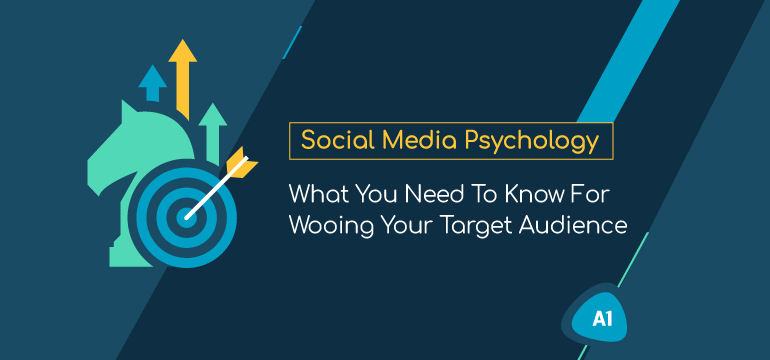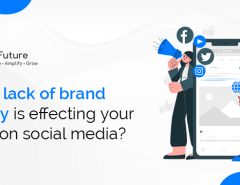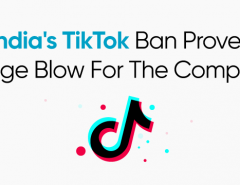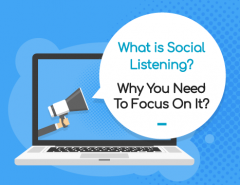We have been marketing through social media for quite a long time. We have hundreds of followers who like, comment on our posts or share them. But have you ever wondered what makes them like your posts and shares? Have you ever tried to decipher social media psychology?
Marketing is all about building brand advocacy. People keep coming to us when someone else tells them who we are and how we can solve their problem. Social sharing is a bridge that connects us with our target audience.
Interestingly, the likes, comments and posts we share on social media can often seem insignificant, but surprisingly they matter as they knock into some of the human elements – such as our addictions, desires, anxieties and joys.
Now, based on this theory, the most crucial question is why do people turn to social media? And why consumers comment on your post?
We can’t deny the fact that Social media is addictive. Research reveals this addiction arises due to certain biological elements in us-
- Dopamine creates the feelings of pleasure and want
- Oxytocin lowers stress levels, feeling of trust, empathy
Here are some social sharing psychology facts, take a look below:
1. People Being Visual Learners Respond To Your Posts
When it comes to the most effective way to communicate with your audience and engage with them, a visual aid is key to create the magic. People might respond to different styles, including Kinesthetic Learners, Visual Learners and Auditory Learners.
Marketing research reveals that a visual component—whether its illustration, video, photo, or something that appeal visually to people allow the consumers to actively look into a product and compare those. Employing such strong visual elements to your social strategy will go a long way to successfully promoting your product and these are the effects of social media.
2. Your Followers Share Positive Content More Often
Psychological Science says evoking certain emotions increase the chances of a message being shared. According to the study, people may get physiologically aroused through some stories or information. Hence due to emotional stimuli or otherwise, the autonomic nervous is activated and social transmission happens.
Taking a close look at the psychology of sharing on social media – a report by Hootsuite reveals that more the content is positive, the more it will get shared. It’s found out that even using humor helps. But amazingly, emojis wield more emotional power. This is because people relate more to the practice of imitative approach in face-to-face conversations and emojis are said to have the prowess to build connectedness.
Using emoticons make the users more positive and they are considered to be more popular as well as influential.
Therefore if we consider social media psychology people prefer to share posts of those who are authoritative in their own domain.
3. Consumers Reciprocate When The Post is Relatable
The ‘Like Button’ on Facebook has been used more than 1.13 trillion times and the number is growing since the time Facebook implemented the “Like” button in it. isn’t it amusing!
The question is why people like on your post?
People prefer this because everybody wants to create and maintain relationship. The simple psychology is when people like each other’s posts, they add value to the relationship and boost the required closeness.
Another major psychology is-people have the tendency of creating reciprocity effect. People feel obliged to return others what they get, although in a small way.
Social media psychology says when a user receives a tag or direct message from the brand, they follow they experience a feel-good factor which compels them to send a reply back. Similarly, the moment you receive a like on your posts, you’ll also feel the pull to reciprocate in some way, whether it’s by signing up for an email list or by sharing something.
Here the psychology of social media marketing is when someone does something nice for you, your instinct tells you to act in the same way towards them.
As a brand you can go for a product giveaway such as you can offer your followers with free content, or even something like a resource hub that your followers can return to regularly according to their requirement.
Psychosocial perspective and social media reports that these freebees help you build trust with your target audience. This way, your followers will also prefer to do something for you in return. For example, you are purchasing your product, following you on social media, signing up for your newsletter, or simply sharing your message with their network.
4. Endowment Effect makes People React on Social Media
The endowment effect states that people retain an object they own rather than acquiring the same purpose when they do not own it. This is a cognitive oblique which points to people assigning more significant value to something if they have some ownership over it.
This would be quite a beneficial catch for every social marketer. Using ‘Endowment Effect’ you can create authentic content showing someone using and finding value in your product, thereby establishing that same value for someone else. Try by giving away a free trial, creating that experiential value directly.
The effect says that people place a greater value on things that they have established ownership once. This is especially for items with symbolic, experiential, or emotional significance. Although researchers propose different reasons for the effect, psychologically it is thought to be factors related to loss aversion.
5. Fear Of Missing Out Makes People Come To Social Media
The fear of missing out or FOMO is a recent fad and this phenomenon is directly related to the rise of social media. Present-day marketers can exploit consumers’ anxiety and present them with something useful.
People cannot stand the fact if they are not being included in something and the effects of FOMO aren’t overly positive.
Thus using the principle of saying phrases like- “this offer expires soon—choose now!” Marketing psychology says that it’s more exploitative. However, here’s an important thing to consider when employing these principles of psychology as a social media marketer- this is all about mild manipulation on the target audience on some level. So when you are using these techniques, make sure to keep your audience’s interest in mind and present them with something which is not forced.
Final Takeaway
It’s known today whatever we do; however, we react all is the result of our psychological feature. So, as a modern-day marketer, you need to tap into your audience’s psychology to the desired result. But there’s a rule; you must do it exceptionally subtly. You need to understand that being transparent with your intent can strengthen trust in your brand. This way, you will engage your current followers more effectively and attract new ones also.
If you want to learn more about consumer psychology, you can come to A1 Future.com, where we have a experts who can guide you on how to tap into your audience’s psychology.




